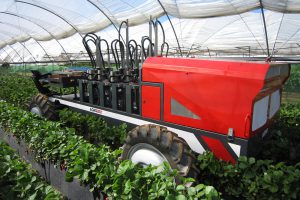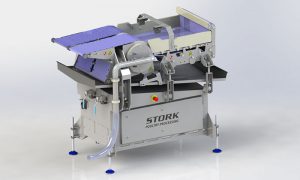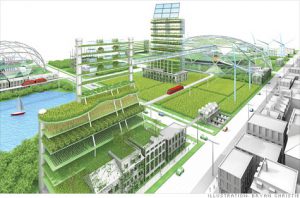What do you think when you hear the term, “Agriculture”? Do you think of conventional food production in rural settings? Or do you think of an Intelligent Autonomous Harvester? What about hydraulic water-driven urban vertical farms in the middle of a city?
 Above: A versatile and reliable “Agrobot” Strawberry Harvester autonomously goes about its task, making production more efficient.
Above: A versatile and reliable “Agrobot” Strawberry Harvester autonomously goes about its task, making production more efficient.
It is no secret that farming economies are changing in Florida. Just last week, the last dairy farm in Clay County closed, while on a positive note, an Orlando nonprofit won $30K to launch an urban community garden. Agricultural operations have to adapt to new technology to meet demands of increasing populations and increasing urbanization; this requires a new, diverse, and adaptable workforce. To fill this, we need the next generation to have a passion for agriculture, competence in Science, Technology, Engineering, and Math (STEM), an understanding of the importance of sustainability, and confidence in communications.
The Disconnect
Unfortunately, as regional economies become more specialized, people become less connected with their food sources. Kids still don’t know where their food comes from, 72% of consumers know nothing or very little about farming or ranching, and when children are asked, “What is a farmer?” they are still conditioned to imagine Caucasian, male, poor, uneducated, manual laborers. Due to this obvious disconnect, it shouldn’t be surprising that the concepts of “agricultural technology” and “urban agriculture” sound like contradictions.
What is agricultural technology?
Some might just think of tractors, but it goes far beyond that! Genomic technology that make plants resistant to disease, sensors that remotely detect soil moisture, GPS mapping of land, X-ray grading systems for poultry, robots that harvest and fertilize crops… and so much more! We will need the next generation to help us keep up with the 9 billion people expected to call Earth home by 2050. The only way to do this is to advance technology. Without it, we would still be using horse and plow.
To the youth: It is important that those of you with knowledge of robotics and those of you with backgrounds in agriculture team up to develop necessary tools for the future!
 Above: Marel Poultry Grading System. Agriculture and Technology will always go hand in hand!
Above: Marel Poultry Grading System. Agriculture and Technology will always go hand in hand!
What is urban agriculture?
Hydroponics, aquaponics, roof-top farming, vertical farming and anything that consists of agriculture in an urban setting would be considered urban agriculture. Urban agriculture helps sustain the ecology of urban areas. Naturally, it results in less food transport and higher availability to fresh veggies. It makes productive use of organic and water waste. Subsequently, it will improve air quality and reduce pollution. There are even socio-economic benefits, like increasing income diversity and opportunity in an area, as well as breaking cycles of poverty for individuals.
To the youth: As regions become more urbanized, those of you aspiring to have a future in farming may want to familiarize yourself with urban agriculture models. This concept especially opens doors to youth living in urban settings who want to pursue farming.
 Above: Michigan State’s Urban Agriculture vision.
Above: Michigan State’s Urban Agriculture vision.
What can we do?
This is where 4-H (and Extension, in general) comes in. We hope to deliver youth development programming that connects STEM, agriculture, and healthy living with youth in both (1) rural and (2) urban settings by:
- Familiarizing youth in traditional rural farming communities with urban agriculture concepts. Engaging them in STEM programing and inspire them to take part in and make advances in agricultural technologies and robotics.
- Introducing youth in urban settings to how they can play a role in developing agricultural technology, robotics, and urban farming. Dispeling misconceptions of agriculture and integrate agricultural examples into STEM programing.
Unprecedented benefits can arise from teamwork between urban and rural youth in promoting, learning, and developing agricultural robotics and urban agriculture.
Three things are certain: Population growth, urbanization, and the need for technological advancement. Urban agriculture is the major tool for sustainable urban development; advancing agricultural technology is the major tool for sufficient food production.
 Above: A Cucumber Harvester Robot.
Above: A Cucumber Harvester Robot.
But… let’s start from the ground up: educating and inspiring our youth to tackle these issues! If you’re interested as an adult volunteer or have children who are interested in these topics, please contact Anne Elise Creamer, Clay County STEM 4-H Agent, at ac864@ufl.edu.
 0
0
